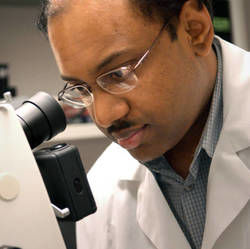Call Now Open
2026 Oxford-Harrington Rare Disease Scholar Award

Ophthalmology
Anti-Inflammatory Gene for Age-Related Macular Degeneration
2014 Harrington Scholar-Innovator
Ask Harrington Scholar-Innovator Jayakrishna Ambati, MD, about his goals as a physician-scientist, and he gives a surprising answer. “My ultimate goal is to put myself out of business,” he responds. Dr. Ambati, Professor and Vice Chair of Ophthalmology and Visual Sciences, Endowed Chair in Age-Related Macular Degeneration and Professor of Physiology, University of Kentucky School of Medicine, is focused intently on developing a treatment for the dry form of age-related macular degeneration (AMD). For patients with the wet form of AMD, there is still no cure, but new treatments can slow its progression at least for a few years. There is no cure or effective treatment for the dry form.
Four years ago, Dr. Ambati and his team discovered in their laboratory that an enzyme deficiency in the eye causes cell death in the retina in dry AMD. Two years ago, they figured out the destructive process the enzyme deficiency causes.
Now, they are in pursuit of a way to block this process as a treatment for dry AMD. They have found an inhibitor. With the assistance of the Harrington Discovery Institute, they will increase its potency and develop it into a gene therapy. “I envision a single injection into the eye that would provide lifetime protection against AMD,” Dr. Ambati explains.
His drive to solve puzzles and create solutions to problems comes to him naturally as the son of a mathematics professor and an Indian literature scholar. Growing up in India and, later, upstate New York, “Education was worshipped in our household,” he recalls. “I had an affinity for seeking out knowledge and a penchant for solving mathematics problems, so I am not surprised by how my career evolved.”
After graduating from high school at age 14, he earned his undergraduate degree in electrical engineering at The Johns Hopkins University at 17, and his MD from SUNY Health Science Center at Brooklyn at 23. Settling early on a career in ophthalmology, he completed a residency at the University of Rochester and a retina fellowship at Harvard Medical School.
“As I went through medical school and my training, it became obvious that I wanted to make a contribution to something that was a societal epidemic,” Dr. Ambati says. “There are as many people with AMD as with all solid tumors combined.” He sees the results of the disease – the progressive vision loss, the depression and loss of independence – firsthand in his clinic. “Macular degeneration is life-altering for the patient and family,” he stresses.
Because AMD is a lifelong disease, he develops strong relationships with his patients and their families, some of them stretching back to 2001 when he came to the University of Kentucky. As much as he is enriched by those long-term relationships, he also finds them frustrating – the reason he continues to see these patients is because there is no cure.
“It became obvious that I wanted to make a contribution to something that was a societal epidemic.”
Source: Article from 2013-14 Annual Publication.